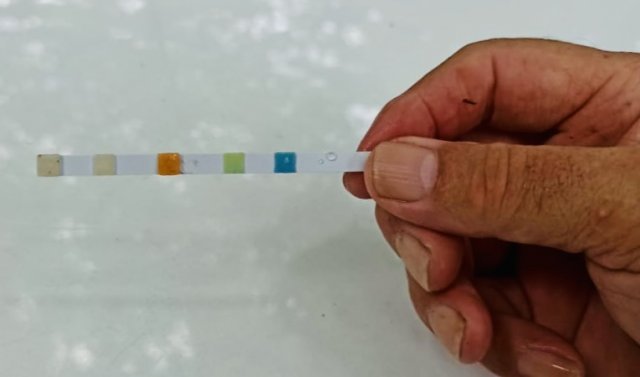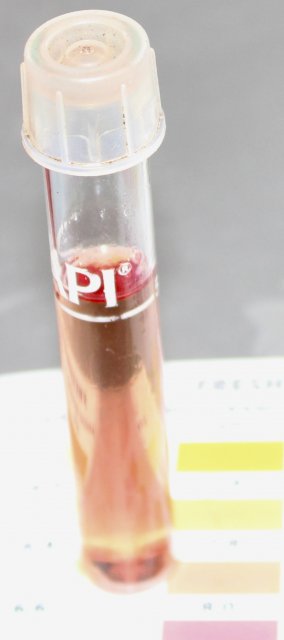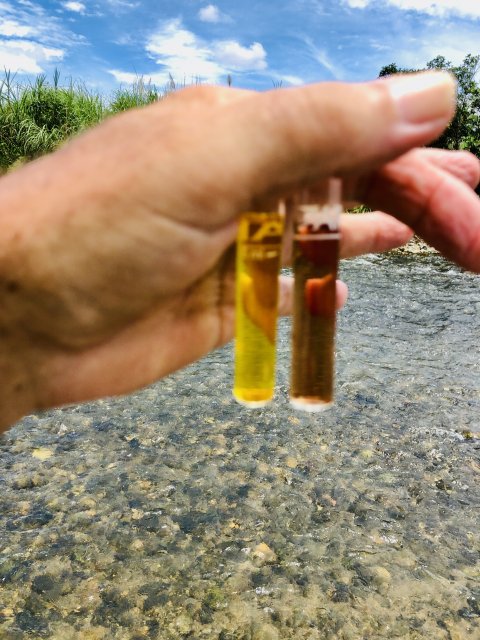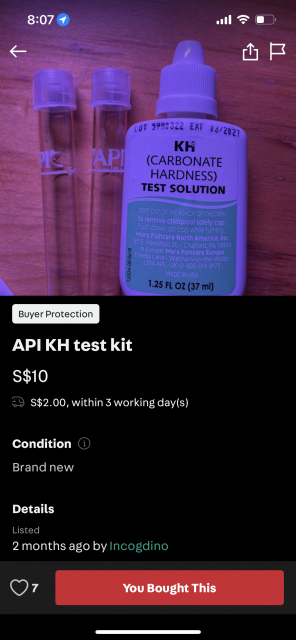What is gH and kH?
- Thread starter Caveden
- Start date
You are using an out of date browser. It may not display this or other websites correctly.
You should upgrade or use an alternative browser.
You should upgrade or use an alternative browser.
GH is general hardness of water.Curious what it is
KH is carbonate hardness of water.
How does gH and kH affect water quality, and what is ideal?
The GH, or general hardness is a compilation of all minerals that contribute to hardness.
The KH or carbonate (calcium) hardness is basically just those calcium based mineral in water.
You can have a high GH that doesn't buffer acids well , but a high KH is related to the calcium/carbonate ions that help buffer acids.
If you have a low KH, and you don't do lots of water changes, pH can easily crash over night.
Water may exit your tap at i.e. 7.6 pH, but as acids from fish waste hit that new water, pH may almost immediately drop significantly.
If you have high KH water, pH may remain stable longer, but buffering capacity erodes over time, so water changes are still needed to replenish that buffering ability.
But because fishes have adapted, and evolved to different GH and KH, knowing which fish you keep, prefers which is important.
African rift fish and Central Americans have adapted to both high GH and high KH conditions, and often develop chronic conditions if not met.
I live in Panama where pH, GH and KH are commonly high. So I keep fish adapted to my water.


Above pH 8, KH 120, GH 180+,
Amazonian fish have adapted to low GH, low KH conditions, and low pH conditions,
Often Gh below 30, KH below 40, pH 5-7
if given high GH high KH and above neutral pH conditions, develop maladies over time like HITH......but....
its not so much the fish themselves, but the different strains of bacteria that proliferate in those varying conditions.
i.e. bacteria that cause chronic HITH prefer high pH (7.5 and above) high GH high and KH, its the kind of soup they have evolved to live in,in nature, and fish from those have over millennia adapted to resist those bacteria, but
fish from low GH low KH conditions are not immune to those bacteria.
TMI?
sorry besides being a long time fish keeper, I'm a retired chemist/microbiologist.
I also collect my own fish, and analyze the water they come from.

The KH or carbonate (calcium) hardness is basically just those calcium based mineral in water.
You can have a high GH that doesn't buffer acids well , but a high KH is related to the calcium/carbonate ions that help buffer acids.
If you have a low KH, and you don't do lots of water changes, pH can easily crash over night.
Water may exit your tap at i.e. 7.6 pH, but as acids from fish waste hit that new water, pH may almost immediately drop significantly.
If you have high KH water, pH may remain stable longer, but buffering capacity erodes over time, so water changes are still needed to replenish that buffering ability.
But because fishes have adapted, and evolved to different GH and KH, knowing which fish you keep, prefers which is important.
African rift fish and Central Americans have adapted to both high GH and high KH conditions, and often develop chronic conditions if not met.
I live in Panama where pH, GH and KH are commonly high. So I keep fish adapted to my water.


Above pH 8, KH 120, GH 180+,
Amazonian fish have adapted to low GH, low KH conditions, and low pH conditions,
Often Gh below 30, KH below 40, pH 5-7
if given high GH high KH and above neutral pH conditions, develop maladies over time like HITH......but....
its not so much the fish themselves, but the different strains of bacteria that proliferate in those varying conditions.
i.e. bacteria that cause chronic HITH prefer high pH (7.5 and above) high GH high and KH, its the kind of soup they have evolved to live in,in nature, and fish from those have over millennia adapted to resist those bacteria, but
fish from low GH low KH conditions are not immune to those bacteria.
TMI?
sorry besides being a long time fish keeper, I'm a retired chemist/microbiologist.
I also collect my own fish, and analyze the water they come from.

Last edited:
Thank you. So from what I understand, having a high kH is able to maintain a more constant pH, which is a good thing?The GH, or general hardness is a compilation of all minerals that contribute to hardness.
The KH or carbonate (calcium) hardness is basically just those calcium based mineral in water.
You can have a high GH that doesn't buffer acids well , but a high KH is related to the calcium/carbonate ions that help buffer acids.
If you have a low KH, and you don't do lots of water changes, pH can easily crash over night.
Water may exit your tap at i.e. 7.6 pH, but as acids from fish waste hit that new water, pH may almost immediately drop significantly.
If you have high KH water, pH may remain stable longer, but buffering capacity erodes over time, so water changes are still needed to replenish that buffering ability.
But because fishes have adapted, and evolved to different GH and KH, knowing which fish you keep, prefers which is important.
African rift fish and Central Americans have adapted to both high GH and high KH conditions, and often develop chronic conditions if not met.
I live in Panama where pH, GH and KH are commonly high. So I keep fish adapted to my water.
View attachment 1527267View attachment 1527268
Above pH 8, KH 120, GH 180+,
Amazonian fish have adapted to low GH, low KH conditions, and low pH conditions,
Often Gh below 30, KH below 40, pH 5-7
if given high GH high KH and above neutral pH conditions, develop maladies over time like HITH......but....
its not so much the fish themselves, but the different strains of bacteria that proliferate in those varying conditions.
i.e. bacteria that cause chronic HITH prefer high pH (7.5 and above) high GH high and KH, its the kind of soup they have evolved to live in,in nature, and fish from those have over millennia adapted to resist those bacteria, but
fish from low GH low KH conditions are not immune to those bacteria.
TMI?
sorry besides being a long time fish keeper, I'm a retired chemist/microbiologist.
I also collect my own fish, and analyze the water they come from.
View attachment 1527269
are you trying to say that rift cichlids are more sensitive hence require a higher kH, whereas amazonian fish are more adaptable and can thrive in lower kH?
gH
High KH is good for some species, and goes a long way to helping maintain tank water stability, but without water changes, only goes so far
I do not consider Amazonian fish more adaptable, the waters in Amazonia are generally soft, with pH at 7 or below.
When Amazonian cichlids such as Oscars, severums, Uarus and many other long lived large species are put in hard, high pH water (and if any other stressor such as high nitrate is present) they easily develop HITH. We have only to look at all the Oscar HITH posts in the disease section, and note the water parameters they are kept in, to see that phenom.
If given natural, soft water, low pH conditions, with enough water changes to keep nitrate low, they are more healthy.
And
I am not saying Africans are more sensitive, because
If African fish are kept in abberent low GH, low KH, and low pH water, combined with a stressor such as high nitrate, they seem to develop ailments over time such as bloat. But if kept in proper parameters they are also normally very healthy.
This is why I advocate keeping, matching and doing research on fish species with the tap water parameters we are given.
I have always wanted to keep Uaru fernendezyepezi, but because they come from black water with a pH of 5, and a GH of 1, attempting to keep it would be delusional on may part, with my pH 8, and GH 120 to 180 range
I do not consider Amazonian fish more adaptable, the waters in Amazonia are generally soft, with pH at 7 or below.
When Amazonian cichlids such as Oscars, severums, Uarus and many other long lived large species are put in hard, high pH water (and if any other stressor such as high nitrate is present) they easily develop HITH. We have only to look at all the Oscar HITH posts in the disease section, and note the water parameters they are kept in, to see that phenom.
If given natural, soft water, low pH conditions, with enough water changes to keep nitrate low, they are more healthy.
And
I am not saying Africans are more sensitive, because
If African fish are kept in abberent low GH, low KH, and low pH water, combined with a stressor such as high nitrate, they seem to develop ailments over time such as bloat. But if kept in proper parameters they are also normally very healthy.
This is why I advocate keeping, matching and doing research on fish species with the tap water parameters we are given.
I have always wanted to keep Uaru fernendezyepezi, but because they come from black water with a pH of 5, and a GH of 1, attempting to keep it would be delusional on may part, with my pH 8, and GH 120 to 180 range
Last edited:



